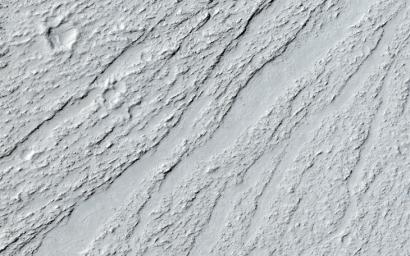
|
Chevrons on a Flow Surface in Marte Vallis
- Click the image above for a larger view
- Full-Res JPEG (2880 x 1800) (834.3 kB)
- Full-Res TIFF (2880 x 1800) (15.6 MB)
Caption:

Map Projected Browse Image
Click on the image for larger version
Lava flows cool as they move allowing their surface to freeze solid. The constant movement below this surface can break it up into a rough mass of jumbled broken rock. Sometimes larger surface areas that are thicker can behave like rafts that are dragged along by the flow.
Both features are visible in this image of an ancient lava flow in Cerberus Planitia. Isolated rafts that are still high-standing are visible and frozen into the flow. The rough areas show where the flow was fastest and have merged in places forming the large chevron-shaped features we see here.
Background Info:
HiRISE is one of six instruments on NASA's Mars Reconnaissance Orbiter. The University of Arizona, Tucson, operates the orbiter's HiRISE camera, which was built by Ball Aerospace & Technologies Corp., Boulder, Colo. NASA's Jet Propulsion Laboratory, a division of the California Institute of Technology in Pasadena, manages the Mars Reconnaissance Orbiter Project for the NASA Science Mission Directorate, Washington.
Cataloging Keywords:
| Name | Value | Additional Values |
|---|---|---|
| Target | Mars | |
| System | ||
| Target Type | Planet | |
| Mission | Mars Reconnaissance Orbiter (MRO) | |
| Instrument Host | Mars Reconnaissance Orbiter | |
| Host Type | Orbiter | |
| Instrument | High Resolution Imaging Science Experiment (HiRISE) | |
| Detector | ||
| Extra Keywords | Color, Map | |
| Acquisition Date | ||
| Release Date | 2014-04-09 | |
| Date in Caption | ||
| Image Credit | NASA/JPL-Caltech/Univ. of Arizona | |
| Source | photojournal.jpl.nasa.gov/catalog/PIA18121 | |
| Identifier | PIA18121 | |
